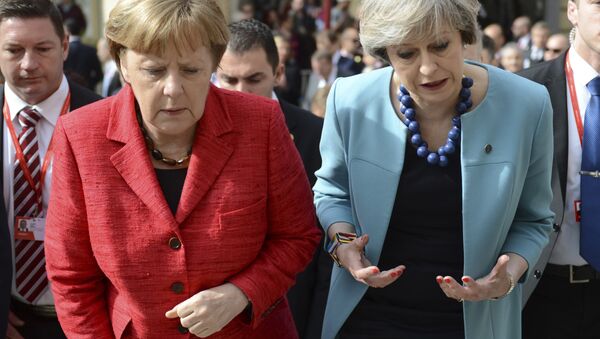In a speech in Mexico City June 11, Angela Merkel argued for global digital rules, similar to those that exist for financial markets.
This needs to be enforceable through international organizations such as the World Trade Organization (WTO), which deals with the global rules of trade between nations.
Theresa May uttered similar sentiments after announcing she would be pursuing an agreement with the Democratic Unionist Party (DUP) of Northern Ireland.
Mrs. May stressed that she will continue to crack down on Daesh ideology, as the terror group use the internet to recruit and radicalize.
Theresa May's proposed response to terrorism is, technically speaking, complete nonsense https:// https://t.co/F0bY9pCGfZ pic.twitter.com/tw9bz7baFM
— WikiLeaks (@wikileaks) June 5, 2017
During the UK election process, and following the terrorist attacks in London and Manchester, Mrs. May focused in on the internet — in particular services such as Google and Facebook — and blamed them for creating "safe spaces" for extremism.
But both May and her home secretary Amber Rudd have tried to enforce and had laws pass which give the authorities greater spying abilities, the most controversial being the demand for real-time access to individuals' online activities and backdoor encryption.
This is insanity
— Glenn Fiedler (@gafferongames) 13 June 2017
However Theresa May's position has been somewhat weakened by the fact she now has to form a coalition government with the DUP, as she failed to reach a majority vote in the recent general election.

The German parliament is considering legislation that would introduce significant fines for companies such as Twitter, Facebook and Google if they fail to act quickly.
Merkel is also pushing for a Europe-wide series of laws that will clamp down on content.
"We still have no international rules," Mrs. Merkel said.
Merkel drew parallels with a G20 agreement to deal with cyberattacks on the global banking system, and noted that Europe and the US need to work together on new common standards.
However, Europe's determination to push new rules on the global internet is persistent, and with Merkel deciding to make it a central part of a G20 summit, there is clearly confident that something will change.


